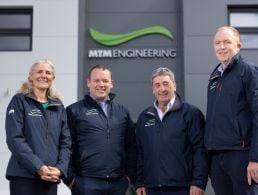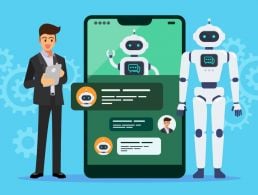Dr Jonathan Costa discusses the skills deficit in Europe and how educational institutions, governments and private companies can work together to close the gap.
Dr Jonathan Costa, the program director of AI and sustainable technologies at Tomorrow University of Applied Sciences says that a desire to answer fundamental questions about the universe drove him into a STEM career.
Understanding the value of transversal talents to all industries, Costa prioritised the development of a diverse skillset and soon found himself working closely with apprenticeship programs focusing on upskilling employees and fostering organisational, data-driven cultures.
As a university programme director, he ensures that learners are equipped with the skills needed to tackle real-world challenges. One such challenge, noted Costa, is the widening skills gap among Europe’s students and professionals, which he said is the result of a number of interconnected factors.
“Rapid technological advancements, particularly in AI and digitalisation, have outpaced the ability of traditional education systems to keep up. There is a growing disconnect between the skills that are being taught and those that are actually required in the workforce,” he explained.
Moreover the continued innovation around specialised technologies has generated a demand for niche skillsets that are not widely available. “This has been compounded by demographic shifts, such as an ageing workforce. In many cases, educational curricula have not adapted quickly enough to these changes, leading to a mismatch between graduate capabilities and industry needs.
“This gap is particularly evident in sectors that are undergoing significant digital transformation, where the demand for skilled workers far exceeds the supply.”
Future consequences
According to Costa, the areas most affected by the current skills gap in Europe are the industries that are experiencing a rapid digital transformation, for example technology, manufacturing and healthcare.
Employees in these fields may find themselves at “risk of obsolescence if they do not acquire new, relevant skills”, he said. “Younger workers entering the job market might struggle to find employment that aligns with their education, while older workers may face challenges in keeping up with new technologies.”
Additionally, SMEs are disproportionately affected, noted Costa, because they often lack the necessary resources to invest in extensive training programmes, limiting their ability to compete in an evolving market, alongside larger, more financially secure companies.
“Addressing the skills gap in Europe requires a comprehensive strategy that includes modernising educational curricula to align with industry demands, fostering partnerships between educational institutions, governments and private sector companies, and investing in lifelong learning and reskilling initiatives,” he said.
Enhancing students’ practical skills through applied learning opportunities that give people hands-on experience, he said, is an effective way to ensure that they are ready for the workforce upon graduation. Also, by actively promoting early-stage STEM education and making it accessible to people from diverse groups, you are ensuring a less homogeneous pipeline of future talent.
“Emphasising flexible and modular learning formats, such as online courses and micro-credentials, can also provide individuals with the ability to upskill and reskill as needed, ensuring that the workforce remains adaptable and resilient in the face of technological change,” said Costa.
AI potential
By driving the demand for new skillsets, developing personalised learning experiences, improving the accessibility of education and creating innovative training, the increased investment in AI could have a significant impact on bridging the skills gap, Costa thinks.
“Moreover, AI can help identify skill gaps in real time, allowing for more targeted and timely interventions. By integrating AI into educational programs, institutions can ensure that students are learning the most relevant and up-to-date skills, preparing them for the demands of the modern workforce,” he explained.
To avoid mass disruption to global workforces, Costa stated by focusing on augmentation, as opposed to automation,
In the workplace, Costa sees AI complementing not replacing human capabilities. “For example, AI can take over repetitive, mundane tasks, freeing up employees to focus on more strategic, creative and value-added activities,” he said.
By including AI in reskilling and upskilling programmes, employers can also show their commitment to job preservation. “Involving employees in the AI adoption process, through transparent communication and training, can help alleviate fears and resistance. By framing AI as a tool that empowers rather than replaces, organisations can foster a more positive and collaborative transition.”
On the flip side, the failure to invest in AI could have a detrimental effect on companies and the wider economy, with the divide between groups skilled in AI and those who are not creating a polarised, less inclusive workforce.
Costa believes that, when leveraged correctly, AI has the potential to address complex social and environmental challenges and align business targets with broader societal goals. “AI can optimise resource use, reduce environmental impact and improve public health outcomes.”
Future focus
Looking to the future, Costa predicts that AI will continue to evolve, integrating itself into every aspect of life and work, playing a critical part in addressing the world’s most pressing issues, including the climate crisis and healthcare.
He thinks there will likely be a surge in the demand for professionals skilled not only in the technical use of AI and other advanced technologies, but who also understand the ethical and societal implications. “The need for frameworks that guide the development and deployment of AI in a way that benefits society as a whole will be paramount.
“Overall, the future of this industry is bright, but it will require ongoing collaboration between academia, industry and policymakers to ensure that the benefits of AI are realised in a way that is equitable, sustainable and aligned with human values.”
Find out how emerging tech trends are transforming tomorrow with our new podcast, Future Human: The Series. Listen now on Spotify, on Apple or wherever you get your podcasts.




